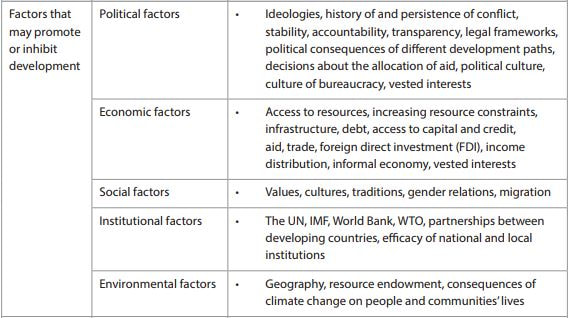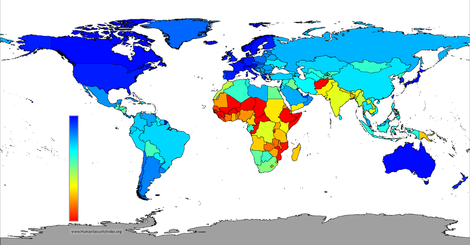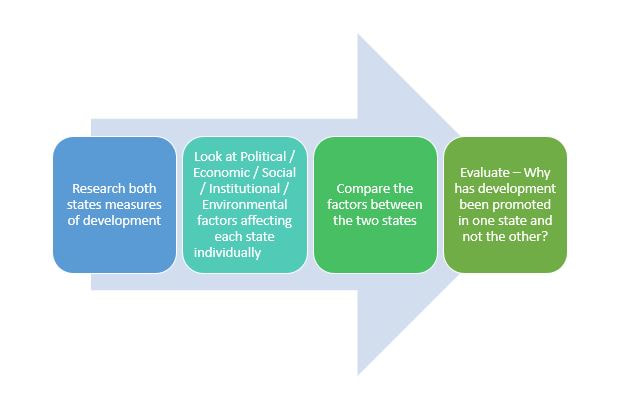|
|
| ||||||
Case Study: The DRCAs we watch the short video try and pick out which factors are affecting the DRC and holding it back from developing.
|
|
|
Assessing the factors that promote or inhibit development in reality:
Rather than looking at each of these factors theoretically we are going to assess how countries that may be traditionally associated as bastions of development and classic examples of failed or fragile states fit into the theory of development.
You are going to look at two countries from my list of developed and developing states from my list below. You will then investigate the different factors of that state to assess why it is either high on most development indices or very low.
You should present by:
- Giving detail on how the state has measured up on at least TWO different scales for measuring development.
- How this development rating has been established due to the different experiences it has had with each of the FIVE factors that affect development.
- You should ensure you include counter claims, theoretical ideas, diagrams and other analysis.
You are going to look at two countries from my list of developed and developing states from my list below. You will then investigate the different factors of that state to assess why it is either high on most development indices or very low.
You should present by:
- Giving detail on how the state has measured up on at least TWO different scales for measuring development.
- How this development rating has been established due to the different experiences it has had with each of the FIVE factors that affect development.
- You should ensure you include counter claims, theoretical ideas, diagrams and other analysis.
|
Classically 'developed' states
Norway USA Japan Australia France Sweden Germany France |
Classically 'developing' states
Bangladesh Somalia Laos Chad Yemen Honduras Niger Afghanistan |
Comparing your countries - Gap minder
How to conduct your research:
The end product of this research should be a short guide that clearly shows an understanding of the states in question and their relative development levels, an analysis of why these levels are what they are and most importantly a clear understanding of the detail of the five factors that affect development.
Home learning reading - Case study: Zimbabwe
|
This article from Foreign Affairs magazine is an excellent case study of how a variety of factors can combine to lead to the failure of a country to develop. Read through this and take notes that identify the following:
- What factor is at work in Zimbabwe (political, institutional, economic, social, environmental) - What were the actions taken by the government? - How did that impact the development of Zimbabwe? |
Home learning 2 - A failed state and development - Myanmar
|
A superb article from Foreign Affairs again, this time looking at the history of Myanmar and the reasons for the increasing spiral into failed state status. If you are looking for a 7, this is a case study well worth reading.
As you go through the article you could make notes on each of the factors and how they apply to Myanmar (Political, Economic, Social etc.) |
Examining the idea of a resource curse: Extra reading
Exam practice question:
Discuss the claim that Economic factors are the most significant factor affecting development.
Break down the concepts:
- Development - what is it and how could it be measured?
Consider the claim and counter claims:
- What are Economic factors?
- What other factors may be pertinent to this question (Social, Institutional, Political, Environmental etc.)
What case studies support / oppose this claim?
Think about how you can apply your countries portfolio to this claim.
Levels of analysis:
Is there a way of considering this differently?
Theory:
Can you apply any traditional theoretical perspectives to this? Marxism, Realism, Liberalism.
- Development - what is it and how could it be measured?
Consider the claim and counter claims:
- What are Economic factors?
- What other factors may be pertinent to this question (Social, Institutional, Political, Environmental etc.)
What case studies support / oppose this claim?
Think about how you can apply your countries portfolio to this claim.
Levels of analysis:
Is there a way of considering this differently?
Theory:
Can you apply any traditional theoretical perspectives to this? Marxism, Realism, Liberalism.


